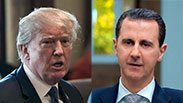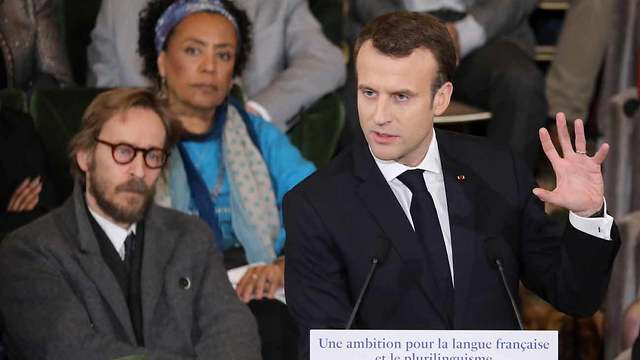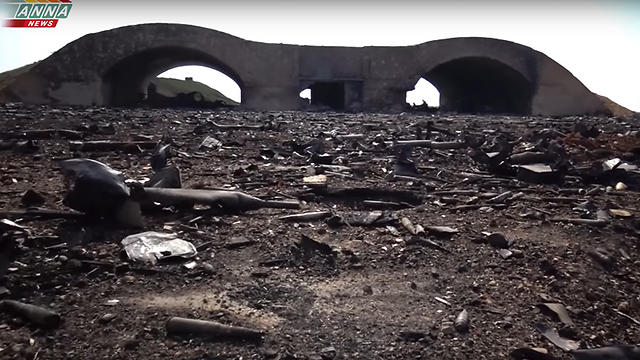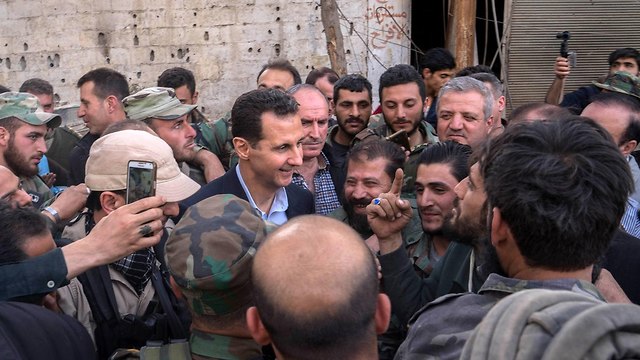

US reportedly considering 8 potential targets in Syria
President Trump, Defense Secretary Mattis mull possible retaliatory strike in Syria in response to alleged use of chemical weapons; CNBC reports 8 potential targets considered, including chemical weapons facility, research institute and 2 airfields.
Earlier Thursday, President Trump told reporters that the decision whether to retaliate to Syrian President Bashar al-Assad's alleged use of chemicals weapons in his country's internal conflict last week will be made "very soon."
"We're looking very, very seriously, very closely at that situation and we'll see happens, folks, we'll see what happens. It's too bad the world puts us in a position like that," he added.

The president, who just Wednesday threatened Russia that American missiles will rain down on Syria, was able to muddle US intentions Thursday. "Never said when an attack on Syria would take place. Could be very soon or not so soon at all!" Trump tweeted.
Defense Secretary Mattis, for his part, said the US has yet to decide whether to attack in Syria.
An American official elaborated to CNBC Thursday, however, that the US was examining eight potential targets for a retaliatory strike. Among those targets are two Syrian airfields, a research institute and a chemical weapons facility.
The official also corroborated previous reports according to which the Syrian army has transferred considerable amount of equipment out of the Syrian air force's bases and into Russian facilities in Syria—on the assumption the US would not attack any Russian assets in the Middle Eastern country.
Last year, Trump ordered the launch of dozens of Tomahawk missiles at the base from which the Syrian planes that carried out a chemical weapons attack in Idlib took off.
Not only the Syrian army is gearing up for the attack, however, but its allies in the years' long civil war—Russia, Hezbollah and Iran—are doing so as well.
Head of the Russian parliament's Defense Committee Vladimir Shamanov, for instance, said Thursday that Russian ships have departed the country's Tartus port for fear of an American strike. The Russian Interfax news agency reported that Shamanov added it was standard operating procedure in cases of a possible attack.
Echoing this sentiment, Russian Foreign Affairs Ministry Spokeswoman Maria Zakharova told Sky News Thursday, "Russia should protect its people on the ground, of course."
Earlier in the day, British Prime Minister Theresa May convened her cabinet to discuss joint military action in Syria together with the US and France. The Daily Telegraph also reported that May ordered British submarines to head towards Syria up to a range allowing them to fire missiles against Assad's army.
The Syrian president himself said Thursday that any action by the West will only destabilize further the already precarious Middle East, saying, "With every victory attained on the battlefield, the voices and actions emanating from several Western countries grow louder in the attempt to change the way things are heading.
"These voices—as well as any conceivable action they undertake—will contribute nothing save increasing the region's instability, and threatening the world's peace and security."
Both Syria and Russia stringently disavow any use of chemical weapons by the Assad regime against its own people, but the West insists such usage occurred. French President Emmanuel Macron, for instance, said France obtained proof that Assad attacked the rebel-dominated region of Ghouta with chlorine gas.

American sources told NBC, meanwhile, that blood and urine samples taken from the attack's casualties were congruent with chemical weapons use.
A team from the Organization for the Prohibition of Chemical Weapons will begin its inspection of the site of the suspected attack Saturday.

















